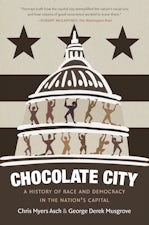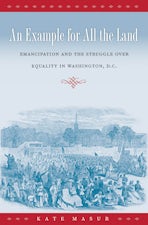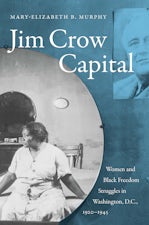At the Threshold of Liberty
Women, Slavery, and Shifting Identities in Washington, D.C.
By Tamika Y. Nunley
272 pp., 6.125 x 9.25, 7 halftones, 1 map
-
Paperback ISBN: 978-1-4696-6222-0
Published: February 2021 -
Hardcover ISBN: 978-1-4696-6221-3
Published: February 2021 -
E-book EPUB ISBN: 978-1-4696-6223-7
Published: January 2021 -
E-book PDF ISBN: 979-8-8908-5750-7
Published: January 2021
John Hope Franklin Series in African American History and Culture
Buy this Book
- Paperback $27.95
- Hardcover $95.00
- E-Book $22.99
For Professors:
Free E-Exam Copies
Awards & distinctions
2021 Letitia Woods Brown Prize, Association for Black Women Historians
2022 Pauli Murray Book Prize, African American Intellectual History Society
2021 Mary Kelley Prize, Society for Historians of the Early American Republic
Honorable Mention, 2022 Darlene Clark Hine Award, Organization of American Historians
Finalist, 2022 Association for the Study of African American Life and History Book Prize
Shortlisted, 2021 Museum of African American History Stone Book Award
Finalist, 2023 Shapiro Book Prize, Shapiro Center for American History and Culture at The Huntington
2023 Francis B. Simkins Award, Southern Historical Association
Consulting newspapers, government documents, letters, abolitionist records, legislation, and memoirs, Tamika Y. Nunley traces how Black women navigated social and legal proscriptions to develop their own ideas about liberty as they escaped from slavery, initiated freedom suits, created entrepreneurial economies, pursued education, and participated in political work. In telling these stories, Nunley places Black women at the vanguard of the history of Washington, D.C., and the momentous transformations of nineteenth-century America.
About the Author
Tamika Y. Nunley is associate professor of history at Cornell University.
For more information about Tamika Y. Nunley, visit
the
Author
Page.
Reviews
“A focused study on the way that Black women have transcended slavery. . . . Well-researched.”—Library Journal
"Nunley makes an incredible contribution to the field of the study of African American women in the nineteenth century. She leaves her readers with an irrefutable understanding of the centrality of Black women in the establishment of the capital’s reputation as a site of liberty and justice for all...[An] impressively cohesive study exemplifies the duality of Black women’s and girls’ lived experiences in the capital at a pivotal turning point in the political project of nation-making."—Black Perspectives
“In this excellent book Nunley offers a roadmap for historians to take Black women’s visions of freedom as seriously as their successes.”—Washington History
“Beautifully illustrates how individual desires for self-possession, family, and community, formed before the Civil War, pushed African American women to work toward a world that more closely resembled the ones they imagined.”—Journal of Southern History
“Extensively and impressively researched. . . . [At the Threshold of Liberty] is extremely rewarding, as the reader gains a sense of the social and cultural geography of Washington, D.C., and the crucial networks that African American women created and sustained as they made themselves on their own terms.”—North Carolina Historical Review
"A major achievement that makes critical contributions to historians’ understandings of Black women’s long-term battles for liberty in the
District of Columbia. It will be of great interest to scholars of slavery, race,
gender, and the Atlantic world . . . . Nunley expertly unpacks archival silences, fragments, and discursive violence in the existing records."—William and Mary Quarterly




